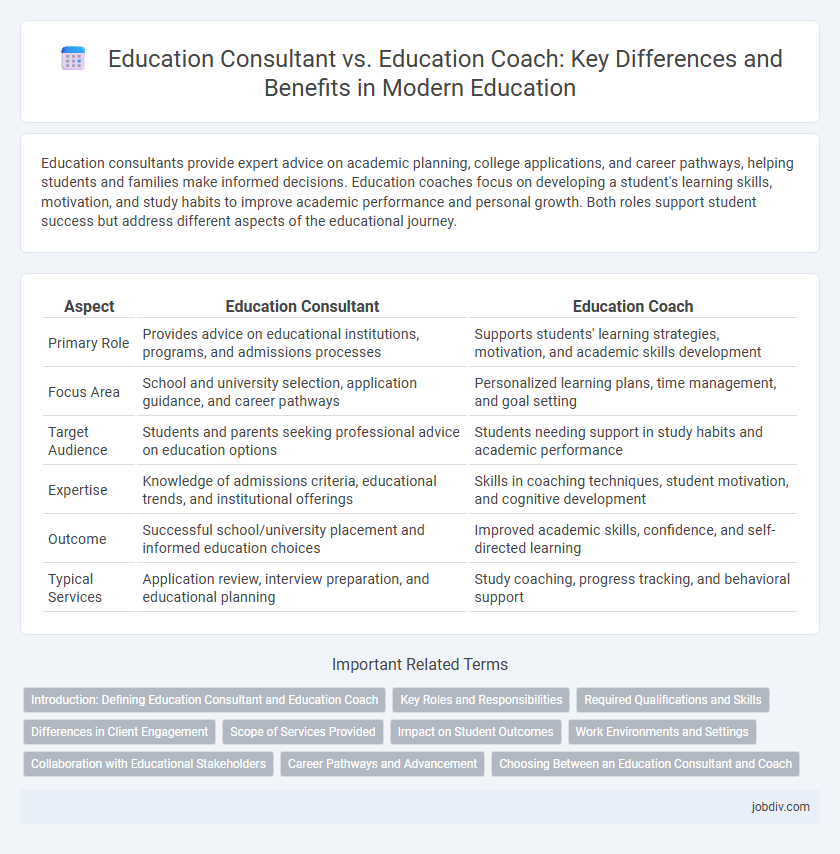Education consultants provide expert advice on academic planning, college applications, and career pathways, helping students and families make informed decisions. Education coaches focus on developing a student's learning skills, motivation, and study habits to improve academic performance and personal growth. Both roles support student success but address different aspects of the educational journey.
Table of Comparison
| Aspect | Education Consultant | Education Coach |
|---|---|---|
| Primary Role | Provides advice on educational institutions, programs, and admissions processes | Supports students' learning strategies, motivation, and academic skills development |
| Focus Area | School and university selection, application guidance, and career pathways | Personalized learning plans, time management, and goal setting |
| Target Audience | Students and parents seeking professional advice on education options | Students needing support in study habits and academic performance |
| Expertise | Knowledge of admissions criteria, educational trends, and institutional offerings | Skills in coaching techniques, student motivation, and cognitive development |
| Outcome | Successful school/university placement and informed education choices | Improved academic skills, confidence, and self-directed learning |
| Typical Services | Application review, interview preparation, and educational planning | Study coaching, progress tracking, and behavioral support |
Introduction: Defining Education Consultant and Education Coach
An Education Consultant specializes in evaluating academic programs, advising on curriculum development, and guiding institutions or individuals to enhance educational outcomes through tailored strategies. In contrast, an Education Coach focuses on personal support, helping students develop skills such as time management, study techniques, and goal setting to improve their academic performance. Both roles play distinct yet complementary parts in navigating educational challenges and achieving success.
Key Roles and Responsibilities
Education consultants analyze institutional needs and develop tailored strategies to enhance curriculum design, accreditation, and overall academic performance. Education coaches focus on individualized student support, offering guidance on study habits, goal setting, and motivation to improve learning outcomes. Both roles contribute to educational success but target different levels of intervention, with consultants addressing systemic issues and coaches enhancing personal development.
Required Qualifications and Skills
Education consultants typically require advanced degrees in education or related fields, along with expertise in curriculum development, policy analysis, and institutional improvement strategies. Education coaches often possess certifications in coaching or counseling and focus on interpersonal skills, motivation techniques, and personalized learning support to enhance student performance. Both roles demand strong communication abilities, but consultants emphasize strategic planning while coaches prioritize individualized guidance.
Differences in Client Engagement
Education consultants typically provide expert advice and strategic planning tailored to institutional needs or individual academic goals, often working through scheduled consultations and formal assessments. Education coaches engage clients more interactively, offering ongoing guidance, motivation, and personalized support to develop study habits, time management, and academic confidence. While consultants focus on delivering solutions and recommendations, coaches emphasize relationship-building and consistent progress tracking throughout the educational journey.
Scope of Services Provided
Education consultants typically offer specialized advice on academic planning, college admissions, and curriculum choices, often guiding students through application processes and testing strategies. Education coaches focus on improving learning skills, motivation, and time management, providing personalized support to enhance study habits and academic performance. While consultants emphasize strategic educational pathways, coaches concentrate on developing effective learning techniques and emotional resilience.
Impact on Student Outcomes
Education consultants analyze curriculum design and policy effectiveness to improve institutional performance, directly influencing student success metrics such as graduation rates and standardized test scores. Education coaches provide personalized guidance and skill-building strategies, fostering student motivation, time management, and learning techniques that lead to enhanced academic achievement. Both roles contribute uniquely to student outcomes by addressing systemic frameworks and individual learner needs.
Work Environments and Settings
Education consultants primarily operate within schools, districts, and educational organizations, analyzing policies and curriculum development to improve institutional effectiveness. In contrast, education coaches work closely with individual students or educators in personalized settings, such as tutoring centers, private practices, or online platforms, focusing on skill-building and performance enhancement. Both roles require adapting to diverse environments but differ in scale and direct interaction levels with learners and educators.
Collaboration with Educational Stakeholders
Education consultants collaborate with school administrators, teachers, and policy makers to develop curriculum improvements and institutional strategies. Education coaches work closely with students, parents, and educators to support individual learning goals and skill development. Both roles enhance educational outcomes through targeted partnerships with key stakeholders in the education system.
Career Pathways and Advancement
Education consultants analyze academic programs and career pathways to help students align their education with industry demands, providing strategic advice for long-term career advancement. Education coaches focus on personalized skill development and goal-setting, enhancing students' motivation and performance to accelerate career progression. Both roles support career advancement, but consultants emphasize structural guidance while coaches prioritize individual growth and confidence.
Choosing Between an Education Consultant and Coach
Choosing between an education consultant and an education coach depends on the specific needs of students and families; education consultants specialize in offering expert advice on academic planning, college admissions, and school selection, leveraging data-driven strategies and extensive knowledge of institutional requirements. In contrast, education coaches focus on personalized skill development, motivation, and time management to improve student performance and foster self-directed learning habits. Understanding these distinct roles helps streamline the decision-making process for tailored academic support and long-term educational success.
Education Consultant vs Education Coach Infographic

 jobdiv.com
jobdiv.com